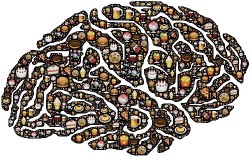
Obsessive Compulsive Disorder
 Obsessive Compulsive Disorder (OCD) is a common and chronic mental illness that has been described as one of the most disabling in regards to how it interferes with an individual’s ability to function in everyday life. Although it is difficult to know how many Irish individuals suffer with OCD, it is estimated that 2-3% of the population have the disorder. OCD is characterised by the presence of obsessions, including repetitive thoughts, impulses or images, and compulsions such as ritualised repetitive behaviours or mental acts. While obsessions and compulsions may occur alone, most frequently both are present. Indeed, OCD is associated with high levels of psychological and emotional distress, interfering with everyday activities and functioning and reducing the individual’s quality of life. OCD is also associated with increased risk of suicide and the presence of several other mental health issues such as depression, personality disorders, anxiety and eating disorders. The disorder can also have detrimental effects on the lives of family members and friends, both socially and in regards to health.
Obsessive Compulsive Disorder (OCD) is a common and chronic mental illness that has been described as one of the most disabling in regards to how it interferes with an individual’s ability to function in everyday life. Although it is difficult to know how many Irish individuals suffer with OCD, it is estimated that 2-3% of the population have the disorder. OCD is characterised by the presence of obsessions, including repetitive thoughts, impulses or images, and compulsions such as ritualised repetitive behaviours or mental acts. While obsessions and compulsions may occur alone, most frequently both are present. Indeed, OCD is associated with high levels of psychological and emotional distress, interfering with everyday activities and functioning and reducing the individual’s quality of life. OCD is also associated with increased risk of suicide and the presence of several other mental health issues such as depression, personality disorders, anxiety and eating disorders. The disorder can also have detrimental effects on the lives of family members and friends, both socially and in regards to health.
The onset of OCD can occur at any time but most commonly appears in childhood or adolescence. OCD can occur in both men and women, regardless of age, social background or culture. Individuals with OCD are often reluctant to seek help, and many attempt to hide their symptoms from family and friends. Because of these issues, there are often delays in the diagnosis of OCD and subsequent treatment.

Symptoms
The obsessions associated with OCD can be defined as recurrent and persistent thoughts, impulses, or images that are experienced as intrusive and inappropriate, causing the individual to experience high levels of anxiety or distress. Individuals can usually acknowledge that the obsessions originate in their minds and not from the external world. These persistent thoughts often include worries regarding dirt and contamination, orderliness, perfection, accidental harm, illness, aggression and sex. The level of insight individuals experience regarding these thoughts can vary, although many indicate a good level of awareness of the irrationality of their symptoms. Where individuals experience poor insight, or an inability to recognise the irrationality of their symptoms, they may also be considered as exhibiting delusional or overvalued ideas.
Compulsions, or ritualistic acts, involve repetitive behaviours, such as hand washing, cleaning and checking, or mental acts, such as praying or counting. Individuals feel compelled to perform these acts in response to an obsession, or according to a self-imposed rule that is applied rigidly. Generally, the function of the compulsive actions are to reduce or eliminate the distress the intrusive thoughts provoke, or provide reassurance that nothing bad will happen. Although generally effective for reducing anxiety in the short-term, these ritualistic behaviours or avoidance can cause significant impairments in daily functioning and social relationships, because of their time-consuming nature.
Causes
As with many mental health issues, the development of OCD appears to involve a complex interaction between biological, psychological and environmental factors.
Biological Factors
Research has indicated that OCD may be a highly inheritable disorder, and it has also been shown to have a strong neural basis. Indeed, imbalances of the neurotransmitter, or brain chemical, serotonin may play a causal role in the development of the disorder. Brain imaging techniques have also identified neural networks associated with urges, and subsequent behaviours in OCD patients. These networks are also involved in regulating anger, sexuality and bodily excretion. Despite observed differences in regular brain functioning and processes involved in OCD, how these differences relate to the development of the disorder is still unknown.
Psychological Factors
Behavioural and cognitive theories have also been postulated to explain the development and maintenance of OCD. Indeed, behavioural theory suggests that when individuals with OCD learn to associate fear with certain objects or situations that are generally harmless, the ritualistic acts or avoidance behaviours serve to minimise this fear and therefore become reinforced, leading to repetition. This fear and avoidance/ritual cycle is likely to begin in times of significant change or stress in predisposed individuals, such as after a bereavement or starting a new job. Although this may account for the maintenance of OCD, the theory fails to account for the cause of the disorder.
According to cognitive theory, the root of OCD lies in individual’s cognitive error, or misinterpretation of their own thoughts. This leads to catastrophizing thoughts and an inflated sense of responsibility. Indeed, this theory suggests that intrusive thoughts can be experienced by most people, but individuals predisposed to OCD will overestimate the likelihood of danger associated with these thoughts, and will therefore feel compelled to perform the ritualistic acts or avoidance behaviours. For example, when a child is persistently being disobedient, a stressed parent may have intrusive thoughts about harming the child. While most parents would disregard these thoughts as a normal reaction to stress, an individual with OCD may interpret these thoughts as a serious danger, which would lead to avoidance. However, the relationship between dysfunctional beliefs and OCD is contentious, as whether dysfunctional beliefs or negative cognitions precede the disorder is uncertain.
Environmental factors
Environmental factors such as negative life events may also play a causal role in the development of OCD. For example, trauma, bereavement, and stress may be linked to the onset of the disorder. However, other research suggests that the role environmental factors play in the development of OCD is minimal.
Indeed, the development of OCD likely involves a complex interrelation of all of these influences. For example, an individual’s genetics could make one vulnerable to environmental stresses, which in turn could trigger the negative cognitions and neurochemical imbalances associated with OCD.
Treatment
Medication
The main empirically supported pharmacological treatment for OCD is pharmacotherapy with selective serotonin reuptake inhibitors (SSRIs). SSRIs work on the neurotransmitter serotonin and they have also been shown to be effective in treating depressive symptoms. Although they remain the first-line medication of choice for OCD because of their efficacy, tolerability and reliability, it is also recognised that some individuals may not respond to this treatment, and once medication use is ceased, relapse is common.
Psychological interventions
Cognitive behavioural therapy (CBT) has been shown to be an effective intervention in the treatment of OCD. This approach aims to address the dysfunctional thought processes associated with OCD by focusing on misinterpretations and replacing them with more realistic appraisals. CBT also targets the physical expressions of anxiety such as raised muscle tension through relaxation training. Exposure techniques are also an important aspect of this approach. In these sessions, an individual may confront the feared situation or object in a safe and controlled manner. Although this can be emotionally challenging, this approach has been shown to be very effective. Further, the individual will be equipped with cognitive tools or strategies to aid in this process.
Further information
If you are suffering from OCD symptoms, you may need to seek help, especially if symptoms are interfering with your daily functioning and relationships. Without treatment, OCD symptoms may not improve, or they could worsen over time. Please speak to your GP, who may refer you for psychological or psychiatric intervention.
Authors

Dr. Gillian Moore-Groarke,
Chartered Health Psychologist.
Ms. Amy-Rose Hayes,
Psychology Graduate PSI.
IrishPsychology.com
5A Harley Court, Wilton, Cork.
